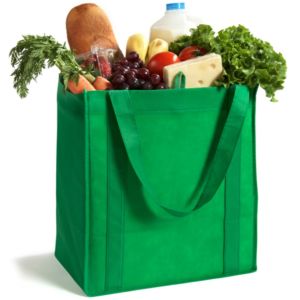Can Reusable Bags At The Grocery Store Change What People Buy?
 Consumers who prefer reusable bags tend to buy more organic food. Researchers say that makes sense, given that the bags suggest a concern for the environment. But they also buy more junk food.
Consumers who prefer reusable bags tend to buy more organic food. Researchers say that makes sense, given that the bags suggest a concern for the environment. But they also buy more junk food.
DAVID GREENE, HOST: You know, before coming into the studio this morning, I stopped at a grocery store and I was checking out, and they charged me 5 cents for using a plastic bag because Washington, D.C., is trying to reduce the use of plastic bags. And I saw other people not paying this price. They had their reusable bags, which more and more people are doing. It’s good news for the environment, maybe not good news, though, for people. And NPR social science correspondent Shankar Vedantam is here to explain why. Hey, Shankar.
SHANKAR VEDANTAM: Hi, David.
GREENE: How can using reusable bags be bad?
VEDANTAM: Well, in some ways, I think, David, it’s a wonderful example of how complicated human behavior can be, where you’re doing something in one domain that makes total sense but it can have unintended consequences in another domain. Uma Karmarkar at the Harvard Business School and Bryan Bollinger, they analyzed purchases made by shoppers at a very large California grocery store, and they find two things, one of which makes intuitive sense and one of which is very counterintuitive.
GREENE: OK.
VEDANTAM: Customers who bring in these reusable bags tend to buy more environmentally conscious food. They buy more organic food. And, of course, that makes intuitive sense to me. But they also buy more junk food. They buy more candy, and they buy more potato chips.
READ AND HEAR THE FULL ARTICLE
By David Greene & Shankar Vedantam at NPR


